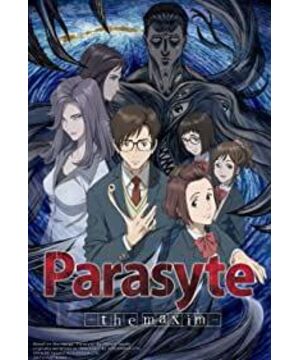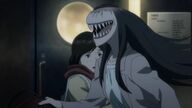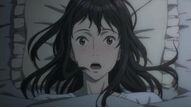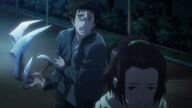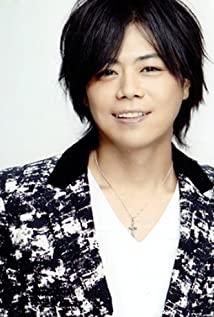set off to seek revenge for the parasitic beast who killed his mother and almost killed himself. His limbs have changed--Migi reshapes his heart while his own cells flow into Shinichi's body, and Shinichi shares Migi's calmness, agility, and strength. Satomi asks, Shinichi, you Will he come back? Shin nodded. But Shinichi
doesn't seem to have come back.
After taking revenge, Shinichi did return to school, but he changed his personality - his heart was as cold as a rock, there were no more tears, and many things happened around the school Bloody events, he was so calm that it was scary. "A dead dog is a pile of meat", his indifference frightened Satomi. In order to be able to withstand everything, he began to understand death in its minimum meaning, like Migi- -The body stops functioning. However, human beings cannot recognize death in this way. Death has too many emotions and meanings for the living. If you stop recognizing and internalizing everything involved in death, a person will not be like a human being, but will become a parasitic beast. A logical robot with self-interest maximization as its only code of conduct.
Shinichi's father, who lost his beloved wife and drowned his sorrows with alcohol, looked at Shinichi who was nothing but asked, son, when did you become so strong, your heart is steel What did you do?
Shinichi was speechless, turned off the lights and said good night.
In order to protect her young self, her mother left a scar on her arm . She has not repaid her kindness, but she hurt her mother many times because she wanted to hide the parasitic secret; because With his own consent and support, his parents went on a trip, but his mother was killed on the way; the parasitic beast appeared in his mother's body and stabbed Shinichi to death; after rebirth, Shinichi's blood bladed the parasitic beast of his mother's body—these four. The severe trauma caused by the heavy blow has left Shinichi with no other way of being than giving up the perceptual perception of death. If the sensory nerves cause pain, cut off the senses and isolate the things that cannot be faced.
The redemption of the eighteenth episode is also particularly exciting. The parasitic beast Tamura's great curiosity about the meaning of his own existence and human beings, his experience and the upbringing of children have gradually made him empathize and even sympathize with human behavior. It violates the As a parasitic beast, he fulfilled his life principle of "maximizing self-interest", stopped the pursuit of coexistence, was shot to death by the police while standing, and handed over the child to Shinichi before his death. The
child was crying. Shinichi said, you are sad Right, of course you are sad, your mother died.
This suddenly reminds me that I have the same fate as the baby in my arms - losing my mother. The mother's love for herself from beginning to end is gradually produced by Tamura for the baby A reminder of love; the parasitic beast Tamura gave up the life principle of his own species and demonstrated to Shinichi the principle of human life: love, or the connection of meaning between people, has the power to make people give up self-preservation. Human death For the living, it is not just a piece of flesh that stops breathing, but the end of a connection. The mother's connection with Shinichi ends, leaving a huge hole in Shinichi's heart. Tamura's behavior reminds him how to use human beings. The way to face death and end. Shinichi, who felt the end of the connection behind death, finally felt the grief of human beings, and finally was able to shed tears, face the past, and get redemption.
Satomi saw this scene and knew Shinichi. Yizhen is back. The
reason why I think this person is set up is because the redemption is done to echo the beginning and the end, the foreshadowing is clear and concise, and it will not be abrupt and blunt. The return of being a strong person, handled cleanly and beautifully. Seen the best character redemption handling in the heat recently. Bring some inspiration to myself too.
View more about Parasyte: The Maxim reviews


